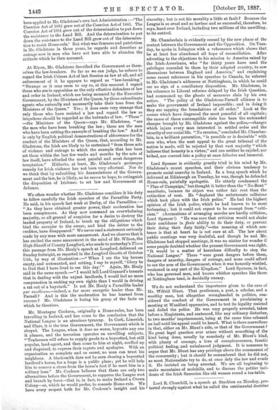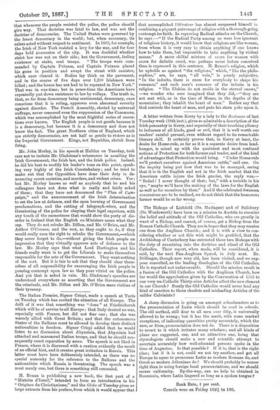Lord R. Churchill, in a speech at Stockton on Monday,
pro- tested strongly against what he called the sentimental doctrine that whenever the people resisted the police, the police should give way. That doctrine was fatal to law, and was not the doctrine of democracies. The United States were governed by the freest democracy in the world ; but, when necessary, its rulers acted without respect to sentiment. In 1863, for example, the Irish of New York resisted a levy for the war, and for four days held possession of the city. It was doubtful whether strict law was not on their side ; but the Government, feeling
existence at stake, sent troops. "The troops were com- xaanded by Captain Putnam, and Captain Putnam placed his guns in position and swept the street with canister, which soon cleared it. Bodies lay thick on the pavement, and in the course of five days over 1,200 Irishmen were killed ; and the lesson has not had to be repeated in New York." That was in war-time ; but in peace-time the Americans have repeatedly put down resistance to law by volleys. The truth is, that, so far from democracy being sentimental, democracy, once conscious that it is ruling, approves even abnormal severity against disorder. The French Assembly, elected by universal suffrage, never censured even the suppression of the Commune, which was accomplished by the most frightful series of execu- tions ever known. The English people is not gentle because it is a democracy, but because it is a democracy and does not know the fact. The great Northern cities of England, which are strictly democracies, are not half so gentle to rioters as is the Imperial Government. Kings, not Republics, shrink from firing.



































 Previous page
Previous page